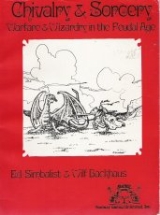 Chivalry and Sorcery, because I talk about Call of Cthulhu all the time.
Chivalry and Sorcery, because I talk about Call of Cthulhu all the time.If Arduin was a beat poet laying down mad rhymes at the Hungy i, then C&S was the mad arcane scientist pouring over Mayan codices and Egyptian pyramid designs to determine scientifically the date of The Rapture. This was a book that started with the intent to fix D&D (And you can usually tell those ones – they have hobbits in them) and then spiraled into a detailed exploration of Medieval social classes, lists of demonic presidents (not what you’re thinking), and probably the best description of alchemy and astrology ever seen in a game, if not the most frustrating to play.
Its character generation was classic in its complexity, from its names of every level of your basic stats (some of the lower ranks of intelligence were Lack-Wit, Dim-Wit, Half-Wit and Dull-Wit), to random alignment determination, which gave you a 1 in 4 chance of being chaotic, ranging from merely Unscrupulous to positively Diabolic. And if you chose to use the random phobia and mental illness tables, you had only a 7 percent chance escaping with a clean bill of health, with a full list of fears and malaises you could succumb to.
Oh, and then you had derived stats that sent half a dozen other games down the rabbit hole following its example. For instance, your personal combat factor (PCF) was your Carrying Capacity (which was your Strength Factor plus your Constitution Factor times you Weight), divided by 100, plus your Military Ability (all of your stats divided by 10, with bennies and penalties for exceptional or poor stats) plus your Dexterity divided by ten, plus a Class Factor that is 1.3 if you are a knight and 0.5 if you are a hobbit.
This was the heavy-weight book for people who thought D&D was way too easy. Never played a campaign of it, but looked at it for inspiration over the years and dreamed of that Holy Grail of doing everything in it, but simpler (though looking at the phobias and the derived stats, it may have had an influence on Call of Cthulhu all those years later – but at least CoC didn’t have hobbits).
More later,


